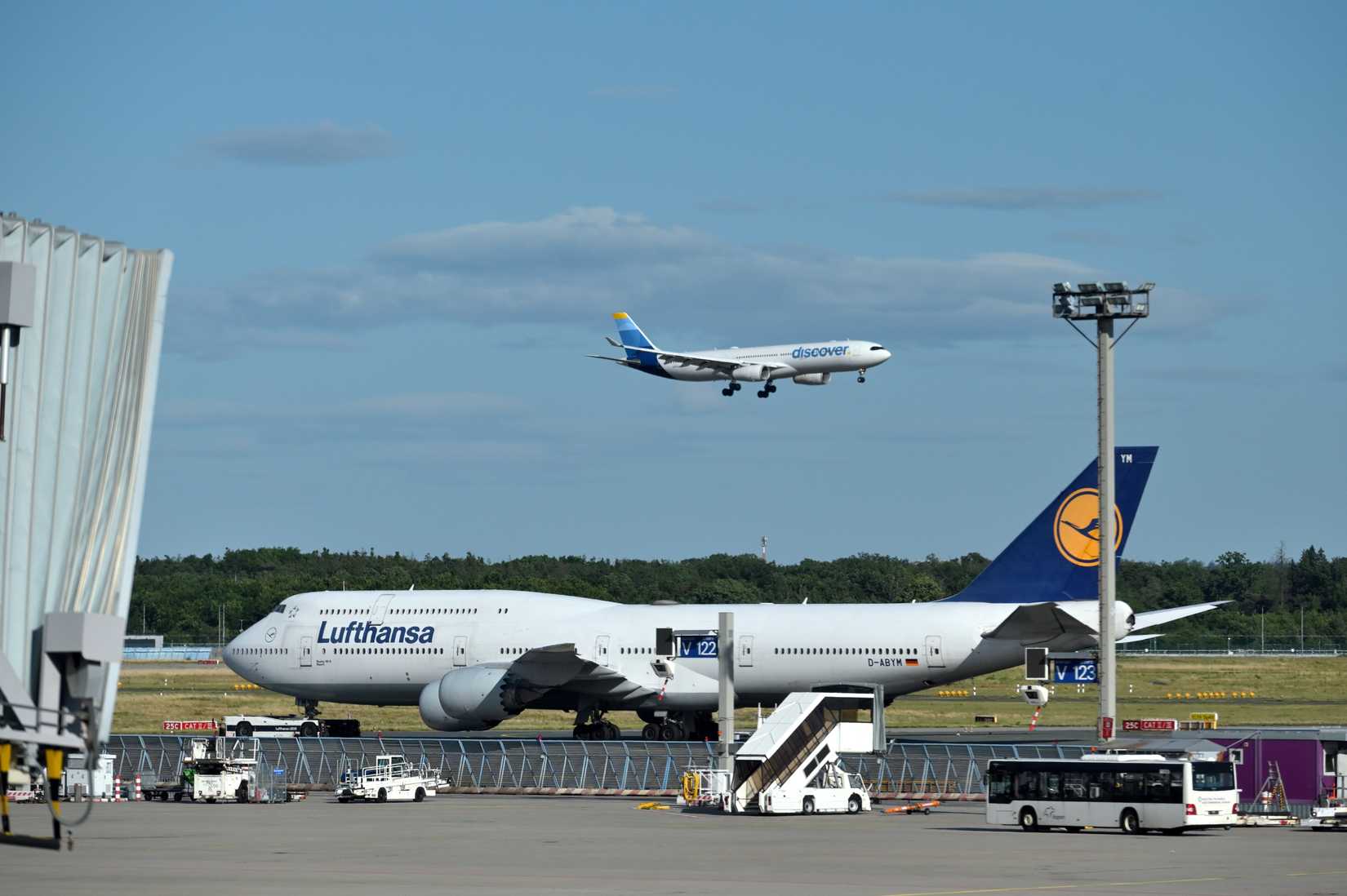The Boeing 747 remains one of aviation’s most iconic jets, known as the “Queen of the Skies.” Although many passenger airlines have retired their 747s, and this beautiful beast is no longer in production, the type remains in service in cargo and specialty operations. As of 2025, a small number of operators still maintain significant 747 fleets, and identifying the top operators offers insight into the niche yet resilient role that the 747 continues to play in global air cargo and charter markets.
This list ranks the five largest 747 operator fleets by number of aircraft in service (or fleet-claimed) in 2025, from smallest of the five to largest. Can you already guess the airlines? The ranking is based on the latest data from sources such as ch-aviation, Planespotters.net, airline press releases, and relevant reporting. So, fasten your seat belts and start our journey with the 747!
5
Kalitta Air
22 examples
Kalitta Air, a US-based cargo and charter operator, rounds out our top five with a fleet that includes a robust contingent of Boeing 747-400 freighters. While most sources list Kalitta’s total aircraft count (of all types) at about 34, the portion that remains 747s is substantial. In 2025, industry commentary indicates that Kalitta Air operates 22 Boeing 747-400s in service. You can read more about it in one of our previous articles.
Kalitta’s business model is more flexible and charter-focused than some of the scheduled cargo giants. It utilizes its 747s in contract logistics, ACMI (aircraft, crew, maintenance, and insurance) roles, as well as charter freight operations. That flexibility allows it to keep older frames in use longer than some scheduled carriers might.
Kalitta’s 747s tend to be of the older 747-400 variants, with an average age of 27 years, rather than the newer 747-8F, which requires more capital investment and stricter performance requirements. The longevity of 747-400s in cargo roles helps Kalitta extract value from these airframes even as others phase them out.
As aircraft retirements or transfers occur elsewhere, Kalitta may remain a static or slowly declining presence in the 747 operator ranks, but as of 2025, it still commands enough 747 strength to feature in the top five globally.
4
Cargolux
26 examples
Cargolux is a well-known full-cargo airline headquartered in Luxembourg, in the heart of Europe, and it has long been associated with 747 freighter operations. According to its official fleet data and other sources, in 2025, Cargolux operates a core fleet of 26 active Boeing 747s (including both −400 and −8 variants). Some sources list 27 747s, because one is currently parked.
According to its 747 fleet breakdown, Cargolux operates a mix of 6 Boeing 747-400ERF, 6 Boeing 747-400F, and 14 Boeing 747-8F aircraft. That makes it one of the more modern 747 operators in this group, thanks to its substantial number of −8Fs. The 747-8F offers improved range, payload, and fuel efficiency compared to the older −400s.
Cargolux utilizes its 747s on its global scheduled freight network, operating routes that connect Europe to Asia, North America, and Africa. Being a dedicated freighter airline rather than a hybrid passenger-cargo operator, it is able to justify keeping 747 capacity in service where demand and network structure support it.
This mix gives Cargolux a modern backbone while still leveraging proven older types for specific routes. Due to this blend, it is well-positioned to replace older frames and maintain its competitiveness over time.
3
Lufthansa
27 examples
![]() Lufthansa is somewhat unique in this list, because it operates both passenger and cargo variants of the 747 (not strictly freighters), and it retains one of the last significant scheduled passenger 747 fleets in the world. Lufthansa is often credited as the largest operator of 747s in terms of passenger numbers in 2025.
Lufthansa is somewhat unique in this list, because it operates both passenger and cargo variants of the 747 (not strictly freighters), and it retains one of the last significant scheduled passenger 747 fleets in the world. Lufthansa is often credited as the largest operator of 747s in terms of passenger numbers in 2025.
According to Flightradar24’s data for 2025, Lufthansa operates 27 Boeing 747s (consisting of 19 747-8s and 8 747-400s). We at Simple Flying also back up the figure of 27 747s in Lufthansa’s fleet in 2025. However, Lufthansa had earlier signaled a program to retire many of its 747-400s by 2028, according to ch-aviation.
Lufthansa’s 747s operate long-haul intercontinental passenger services, particularly from  Frankfurt Airport (FRA) to destinations in the Americas, India, and Asia. Due to their capacity and prestige, they remain a valuable marketing asset as well as a workhorse asset. In cargo roles, Lufthansa Cargo also utilizes widebodies, but the passenger side is what sets Lufthansa apart in this list.
Frankfurt Airport (FRA) to destinations in the Americas, India, and Asia. Due to their capacity and prestige, they remain a valuable marketing asset as well as a workhorse asset. In cargo roles, Lufthansa Cargo also utilizes widebodies, but the passenger side is what sets Lufthansa apart in this list.
Lufthansa also faces ongoing transition plans. In its capital markets presentations and press statements, it has outlined intentions to gradually shrink the number of widebody types and eventually phase out older 747-400 models. That said, in 2025, the 747 remains central to Lufthansa’s identity for large-capacity long-haul flying.
Because Lufthansa’s 747 fleet straddles both passenger and cargo roles (or combinations thereof), it is a hybrid operator in this list rather than a pure cargo specialist.
2
UPS Airlines
43 examples
UPS Airlines is a major cargo airline and a key player in global logistics. In 2025, UPS claims a fleet of 43 Boeing 747 aircraft, making it one of the largest 747 operators in the world. Both ch-aviation and planespotters.net report that UPS uses 43 747s as the backbone of its heavy, long-haul operations.
UPS flights under its own brand operate the Boeing 747-400 (BCF/FSCD conversions) and the more modern 747-8F freighters. UPS is considered the largest operator of the 747-8F. According to a fact sheet from UPS itself, this cargo airline lists 747-400 (BCF) and 747-400FSCD as part of its fleet, as well as 747-8F.
One recent development is UPS’ acquisition of two former ![]() Qatar Airways 747-8F aircraft, which will bring additional capacity to its operations, as previously reported in one of our articles. That kind of acquisition helps the company maintain and even grow its 747 strength despite retirements elsewhere.
Qatar Airways 747-8F aircraft, which will bring additional capacity to its operations, as previously reported in one of our articles. That kind of acquisition helps the company maintain and even grow its 747 strength despite retirements elsewhere.
In terms of utilization, UPS’ 747s are used on long-haul cargo routes connecting its global hubs, handling volume-intensive portions of its logistics network. The combination of legacy 747-400s and more efficient 747-8Fs gives UPS flexibility in deploying the appropriate asset for route demand.
Thus, at number 2, UPS is only edged out by one operator in the sheer number of 747s, but its scale of usage and importance to its operations make it a powerhouse in 747 operations.
1
Atlas Air
65 examples
Topping the chart is Atlas Air, widely regarded as the largest operator of Boeing 747s in 2025. According to a fleet announcement in August 2024 by Atlas Air, the company operates 65 Boeing 747 aircraft (comprising 17 747-8Fs, 39 747-400Fs, 5 passenger 747-400s, and 4 Large Cargo Freighters / LCFs). The same press release states that Atlas manages “the world’s largest fleet of Boeing 747 freighter aircraft.”
Other sources, such as ch-aviation, refer to Atlas Air’s strong commitment to 747 operations and its strategic positioning in intercontinental cargo logistics. The breadth of Atlas’ 747 operations is not limited to pure freighter roles. It also supports cargo charter, ACMI, and various projects, including nose-loading LCF work. The 4 Large Cargo Freighters (LCFs) are modified 747s used for outsized cargo tasks (for example, transporting components of the Boeing 787) – an area where the 747’s nose-loading capability is uniquely valuable.
Atlas is also investing in further 747-8Fs and announces growth in its 747 fleet to meet cargo demand. The capability to mix both older and newer 747s, along with specialized conversions, provides Atlas with flexibility across a wide range of cargo tasks and routes.
Because Atlas’ entire business model largely revolves around 747 and widebody logistics, it is no surprise that it leads the list. Its scale and diversity of 747 usage, from scheduled freight to charter to outsized cargo, make it the most prominent 747 operator in 2025.
And finally, here’s a recap of the top five Boeing 747 operator fleets in 2025 (from fewest to most):
|
Rank |
Operator |
Approx. Number of 747s |
|---|---|---|
|
#5 |
Kalitta Air |
22 (747-400) |
|
#4 |
Cargolux |
26 (747-400 + 747-8F) |
|
#3 |
Lufthansa |
27 (747-8 + 747-400) |
|
#2 |
UPS Airlines |
43 total 747s |
|
#1 |
Atlas Air |
65 total 747s |
The persistence of these fleets highlights the enduring significance of the 747 in cargo operations, despite most passenger operators having retired the type. That said, pressures remain, such as fuel cost, maintenance complexity, emissions regulation, and the economics of twin-engine widebodies, all of which challenge the 747’s long-term viability.
Looking ahead, we might see further retirements of 747-400s, consolidation of 747-8 fleets, and continued conversion projects (like LCFs). However, given the niche advantages, especially for outsized or nose-loaded cargo, the 747 still carves out a space that twinjets find hard to replace entirely.







